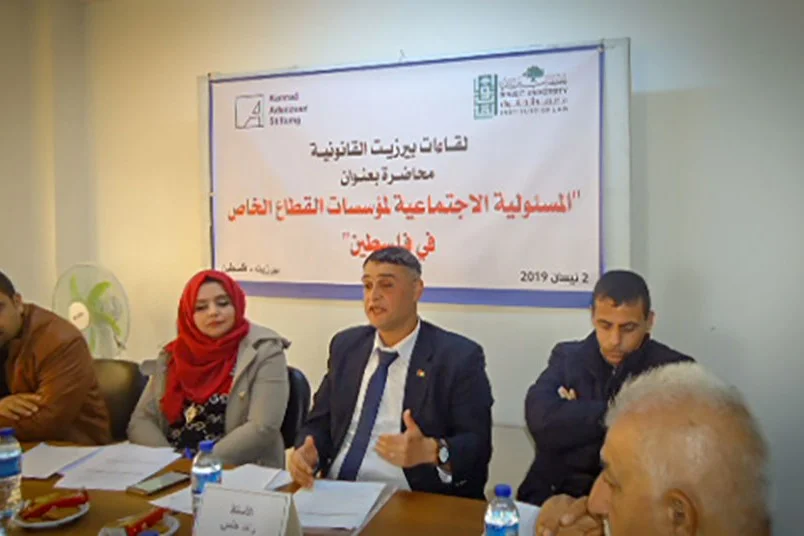The Institute of Law holds a legal meeting in Gaza on “The Social Responsibility of Private Sector Institutions in Palestine”

The Institute of Law at Birzeit University organized a legal meeting entitled “Social Responsibility of Private Sector Institutions in Palestine” in partnership with the Konrad Adenauer Foundation.
Mr. Raed Helles, a researcher in economic affairs at the Palestinian Planning Center, and Mr. Ghassan Abu Hatab, who commented on the paper, spoke at the meeting. At the beginning, Ms. Lina Al-Tunisi, the institute’s coordinator in Gaza, welcomed the participants.
Mr. Raed Hellas began the meeting by talking about the concept of social responsibility, where he pointed out that there are many definitions of the concept of social responsibility, while there is a common denominator among most definitions, which is that social responsibility is a concept according to which institutions include social and environmental concerns in the policies and activities of their business with the aim of enhancing their role. In the community. He added that social responsibility is a commitment and ethical behavior on the part of the business sector to contribute to sustainable economic development and takes into account the aspirations of stakeholders.
Helles then went on to talk about the importance of social responsibility in terms of improving living conditions and supporting and developing society, in addition to enhancing the image and reputation of the brand and increasing productivity and quality. It addressed the principles of social responsibility, including the institution’s responsibility as an active part in community development, transparency in the work carried out by the institution, in addition to the institution’s commitment to ethical principles before its communities and before its employees.
The speaker added that one of the reasons for the growing interest in the concept of corporate social responsibility is to address the negative effects of wrong economic practices, including the failure to achieve social justice among the countries of the world, the weak ability of the state to control its economy, and its inability to protect local producers from risks and disasters. Environmental damage that has caused serious human and environmental damage.
The speaker then touched on the contribution of the private sector to economic growth and employment, where he pointed out the distinction of private sector institutions in Palestine as being the most capable of playing a fundamental role in economic recovery, given the characteristics of these institutions, as they are the most productive in Palestine and are characterized by the ability to confront Crises and recovery from their effects. He added that the private sector’s contribution to the gross domestic product in Palestine reached 78.9% during the period 1997-2016, and this is due to the large role that the private sector plays in economic development, while the private sector’s contribution to employment amounted to about 66.7%, while the private sector’s contribution to employment amounted to about 66.7%, while the Overall, it is about 22.5%.
Then, Professor Ghassan Abu Hatab commented on the study, where he said that the concept of social responsibility is still intertwined and inaccurate, and that there are four circles of deprivation that converge in the Arab world, which are deprivation and social marginalization with all the decline in social capital of health, education, and systems. Social protection, and economic marginalization expressed in the decline in organized and protected job opportunities, and the decline in the level of income and food security, in addition to deprivation and marginalization in the circle of politics and governance in all its dimensions, especially with regard to development governance. The fourth is the episode related to the severe imbalance in water, soil, and energy resources. Its connection to sustainable growth and deficits in government budgets and its relationship to the labor market.
Then he moved on to talk about the analytical links between the human development approach and the 2030 Agenda, where he pointed out some critical observations about the study, including the lack of a sound information base that enables researchers to subject it to the methods of analysis approved in econometrics, and the difficulty related to the concept of corporate social responsibility, Then he asked: How can the social costs and returns of the social activities of private sector companies be determined and measured? And thus measuring the size of the social contribution or what is called social responsibility, and then evaluating the social role of the private sector in the process of sustainable development?
At the conclusion of the meeting, the discussion was opened, which included many questions, interventions and recommendations, the most important of which was the absence of legislative, regulatory and institutional frameworks that would enhance the concept of social responsibility for Palestinian private sector institutions, and ways to enhance the concept of social responsibility from the government, the private sector, civil society and the media.
 Algeria
Algeria Bahrain
Bahrain Comoros
Comoros Djibouti
Djibouti Egypt
Egypt Iraq
Iraq Jordan
Jordan Kuwait
Kuwait Lebanon
Lebanon Libya
Libya Mauritania
Mauritania Morocco
Morocco Oman
Oman Palestine
Palestine Qatar
Qatar Saudi Arabia
Saudi Arabia Somalia
Somalia Sudan
Sudan Tunisia
Tunisia UAE
UAE Yemen
Yemen




